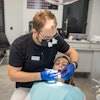
Giving patients nonsteroidal anti-inflammatory drugs (NSAIDs) like ibuprofen before or during surgeries may reduce their risk of developing postoperative delirium, according to a press release from the American Society of Anesthesiologists (ASA).
It is believed to be the largest study showing that nonsalicylate NSAIDS may be even better at decreasing the risk of delirium than acetaminophen, according to research presented at the Anesthesiology 2024 annual meeting, which was held October 18-22 in Philadelphia.
"Anesthesiologists use several methods to try to prevent this complication, and our research shows that a simple intervention such as giving patients an NSAID could be another very effective option," Dr. Steven Frank, co-author of the study and a professor at Johns Hopkins University in Baltimore, said in the release.
Postoperative delirium, which is a change in mental function that can cause confusion, occurs in up to 15% of surgical patients. It can occur the first day after a procedure and can last up to seven days. The risk of postoperative delirium may be associated with factors, including pain, age, stress, anxiety, and insomnia. This type of delirium can lead to longer hospital stays, more complications, and higher medical costs, according to the release.
To explore the use of NSAIDs, a large medical records database was analyzed to identify patients who had surgery with anesthesia between 2014 and 2023. Patients were grouped by ages 18-64 and 65 or older and the medications they received. Participants were separated by those who took acetaminophen only, salicylate NSAIDs only, and nonsalicylate NSAIDs only on the day of surgery or before or during the procedure. Researchers then compared their rates of delirium over a seven-day period after surgery.
Nonsalicylate NSAIDs lowered the risk of delirium compared to acetaminophen and salicylate NSAIDs in both age groups. Overall, patients in the 18-64 age group, which included 210,678 patients, who were given nonsalicylate NSAIDs had a 22% lower risk for postoperative delirium than those given acetaminophen.
When comparing those who took nonsalicylate NSAIDs versus salicylate NSAIDs, which included a total of 32,538 patients in the 18-64 age group, those who took the nonsalicylate variety had a 70% lower risk for postoperative delirium, according to the release.
In those over 65, which included 72,130 patients, those given nonsalicylate NSAIDs had a 33% lower risk for postoperative delirium than those given acetaminophen. In this same age group, patients given nonsalicylate NSAIDs had a 45% lower risk for postoperative delirium than those given salicylate NSAIDs, according to the release.
However, Frank noted that clinicians should assess a patient's overall health and risk factors before giving them NSAIDs since the drugs have side effects, including impaired kidney function and increased risk of bleeding. Although additional research should be done in the future, the research is promising, Frank said.
"Our findings suggest that using a non-salicylate NSAID may make surgical procedures safer by reducing postoperative delirium," Frank said.




















